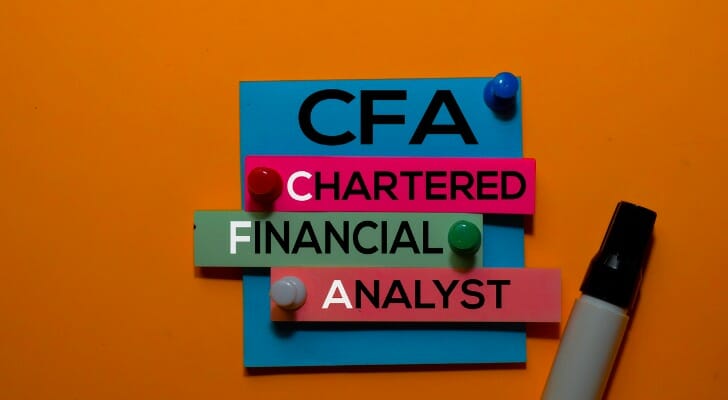The work of a financial risk manager (FRM) and a chartered financial analyst (CFA) can overlap, but they have their own specialties. FRMs identify, price and mitigate risk, while CFAs generate financial analytics and assess security markets and trends. Learn the basics of both designations, how they differ and which one is right for you.
What Is an FRM?
An FRM designation is awarded by the Global Association of Risk Professionals. It’s the leading certification globally for risk management. Their work falls into three general areas: risk-based recommendations; risk pricing; and risk mitigation.
In order to earn an FRM designation, candidates must pass the FRM exams (Part 1 and Part 2) and demonstrate two years of relevant work experience. Candidates are encouraged to spend 150 hours preparing for each level of the exam. Those who have earned the FRM designation include financial professionals who work in the fields of market risk, credit, asset management and insurance, among others.
This credential does not empower the holder in any unique or legal way. Unlike an accounting license or law license, for example, it is not required to practice as a risk manager. An FRM certificate shows that the holder met the qualifications for this certificate. It is typically a way for someone to advance their career and earn higher-paying positions.
What Is a CFA?
There are many designations in the financial world, but two of the most common are the CFA designation and the FRM designation. A CFA designation is given to financial analysts and other professionals who meet certain criteria of education, work experience, ethics and knowledge.
To become a CFA, candidates must pass three exams, meet the required work experience, submit two to three professional references and apply to become a charterholder, or a member, of the CFA Institute. This designation is awarded by the CFA Institute, the organization that creates the curriculum, requirements and gives the exams.
Applicants must pass all three exams to earn the designation. These exams, which are given annually, are notoriously difficult and applicants are encouraged to spend at least 300 hours studying for each exam. Many candidates pay outside test prep groups to boost their chances of passing these tests.
CFA vs. FRM
The CFA designation is one of the cornerstone designations within the financial space, held by 154,000 financial professionals. The FRM designation, with more than 50,000 awardees, rose in popularity following the mortgage crisis, in which risk was not properly assessed and mitigated. Thus, the need for a new field of professionals who not only understood the potential risk of certain investments but also took steps to reduce those risks, emerged.
Generally speaking, the CFA designation covers a broader range of topics within the financial sector, while the FRM designation homes in more on risk management such as market risk, volatility, liquidity and inflation.
CFAs and FRMs also differ in terms of the framework for earning the designations. First, the CFA designation requires that candidates pass three exams (Level I, II, and III), have a bachelor’s degree or four years of relevant experience, become a member of the CFA Institute and have two years of relevant investment work experience. The FRM requires candidates to pass two exams and have two years of work experience within the field of financial risk.
Bottom Line
The FRM would be best for those seeking positions specifically in risk management or risk assessment, such as those working for banks or corporate treasury departments. Risk exists for the average investor, but it’s also a fact of life for the financial institutions that serve them. An FRM can help a firm identify risk, price it into their offerings and minimize that risk whenever possible.
The CFA is meant for those within the field of investment management like investment bankers or portfolio managers. Someone holding a CFA has passed rigorous exams on economics, ethics, money management and a host of financial topics. The designation is globally recognized.
Tips for Financial Planning and Investing
- Many financial advisors hold CFA or FRM designations, but they’re not the only certifications to look for when choosing an advisor. SmartAsset’s free tool matches you with up to three vetted financial advisors who serve your area, and you can interview your advisor matches at no cost to decide which one is right for you. If you’re ready to find an advisor who can help you achieve your financial goals, get started now.
- Investing is a great way to grow your assets and keep you moving on track towards a stable retirement. Try using SmartAsset’s investment calculator to make sure that you’re investing properly and hitting your goals.
Photo credit: ©iStock.com/metamorworks, ©iStock.com/syahrir maulana, ©iStock.com/Fokusiert


